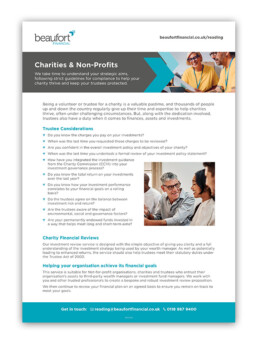
We take time to understand your strategic aims, following strict guidelines for compliance to help your charity thrive and keep your trustees protected.
Being a volunteer or trustee for a charity is a valuable pastime, and thousands of people up and down the country regularly give up their time and expertise to help charities thrive, often under challenging circumstances. But, along with the dedication involved, trustees also have a duty when it comes to finances, assets and investments.
Trustee Considerations
- Do you know the charges you pay on your investments?
- When was the last time you requested those charges to be reviewed?
- Are you confident in the overall investment policy and objectives of your charity?
- When was the last time you undertook a formal review of your investment policy statement?
- How have you integrated the investment guidance from the Charity Commission (CC14) into your investment governance process?
- Do you know the total return on your investments over the last year?
- Do you know how your investment performance correlates to your financial goals on a rolling basis?
- Do the trustees agree on the balance between investment risk and return?
- Are the trustees aware of the impact of environmental, social and governance factors?
- If you have permanently endowed funds, are they invested in a way that helps meet long andshort-term aims?
Financial Charity Reviews
Our investment review service is designed with the simple objective of giving you clarity and a full understanding of the investment strategy being used by your wealth manager. As well as potentially leading to enhanced returns, the service should also help trustees meet their statutory duties under the Trustee Act of 2000.
A charity’s financial requirements and goals will change over time, so we take a long-term view of your needs covering your organisation. By taking this approach, you can relax in the knowledge that the path to your organisation’s financial goals is being closely monitored and managed to ensure both goals and expectations are addressed in the most effective way possible.
- Review your financial objectives set in your investment policy statement
- Review the suitability of the benchmarks set
- Identify risks in your portfolio and explore how to deal with them
- Review the performance of your investment portfolio/investment manager
- Undertake a cross-market comparison
- Review all costs and document clearly
Helping your organisation achieve its financial goals
This service is suitable for Not-for-profit organisations, charities and trustees who entrust their organisation’s assets to third-party wealth managers or investment fund managers. We work with you and other trusted professionals to create a bespoke and robust investment proposition.
We then continue to review your financial plan on an agreed basis to ensure you remain on track to meet your goals.

The Butler-Sloss Ruling
In 2022, a landmark legal case took place, with implications for charities (Butler-Sloss v The Charity Commission for England And Wales [2022] EWHC 974 (Ch)).
The trustees of two charities, with a particular focus on environmental protection, developed new draft investment policies that sought to exclude investments that didn’t align with the 2015 Paris Agreement on climate change.
This approach would have excluded approximately a fifth of the total investable universe, and trustees expected that would be even higher once further credential information about companies was forthcoming. Subsequent discussions resulted in reducing the amount to be directly invested in equities and increasing that to be invested in thematic funds with a green focus and, in general, sustainability funds. The proposed investment policy still had a target financial return.
As part of the court case, both the Charity Commission and the Attorney General submitted that the two trusts did not adequately balance the potential financial detriment that would be suffered by the adoption of their proposed investment policy with the conflict to charitable purposes.
The decision in Butler-Sloss is significant because it establishes that charitable trustees have considerably wider latitude in determining a suitable investment policy than previously thought.
The key parts of the judgement:
- Trustees’ first duty is to further their charity’s purposes, and investment decisions need to do this, too.
- Maximising financial return “from the investments that are made” is the “normal” way to do this (social investment or programme-related investments use separate powers) in a manner that also manages risk appropriately and benefits the charity and its objects.
- Where trustees consider investments to be potentially in conflict with charitable purposes, they have the discretion to exclude them from investments subject to a “balancing” exercise on the extent of the conflict and the potential financial effect (including reputational damage).
- Acting honestly, reasonably and responsibly, and with a correctly processed balancing exercise, allows trustees to comply with their legal duties (ensuring this is all properly minuted).
What does this mean?
Technically, the judgement is a clarification of the law and, by nature, a restatement of the relevant legal principles. The real question is what impact this has in practice, which will be determined by how foundations and other charity investors apply the principles in the coming years.
The second progress report from signatories to the Funder Commitment on Climate Change shows that more foundations are considering climate change as part of their investments, so this is likely to be something that more trustee boards will consider, particularly now that the Charity Commission has published their revised CC14 guidance reinforcing the principles confirmed in the Butler-Sloss ruling.
Videos
Client tax guides

Business succession planning
If you are a business owner, business succession planning and insurance is important. It is simply the process of planning for what you want to happen if you (or your co-owner, if you have one) were to die or fall seriously ill.
Sign up to our newsletter
Read our monthly newsletter full of useful financial tips and advice.
After 45 years of working, worrying, scrimping and saving, I can give up work and never work again. I can't stop thinking about that. It seems like the day of reckoning has arrived!S, Goddard. Basingstoke
Sam has been so efficient in handling my requests for income and always ensures that I have everything I need and most importantly when I need it. This gives such reassurance that I am in safe hands and that my financial needs will be met. Thank you to Sam, Amanda and Amy for looking after me so well.C, Delahov
We have been with Beaufort Financial Reading since their inception and are very happy with them. They have managed our investments with excellent results yet the team remains friendly, professional and accessible. We are in very good hands.L & P Squire
Tony has been my financial adviser for well over a year. During that time he has tailored his services to my and my wife's personal needs as we near the end of our working lives. He has given us sound advice on Inheritance Tax, this was unprompted and came as a result of his research into our financial resources. When making additional investments, Tony always undertakes research and offers a selection of funds which can fulfil our current financial goals. His manner is always courteous and respectful and he listens carefully as one outlines their financial objectives. R, Steward
Very helpful and informative as always. Andy's insight into the financial and political world and how that affects my investments was interesting to hear. The meeting was well paced and un-rushed and gave me confidence in both Andy and Beaufort Financial Reading.P, Williams
I know you are aware of my love of organisation and how sometimes I can be quite demanding, but I wanted to say that both Sara and I have been very impressed with how Julie-Marie has not only implemented your strategy but how she has responded to our needs in a prompt, efficient and professional manner. She is a great part of the team!P, Barcham
Beaufort Financial and Tony Gardiner were recommended to us by our Accountant in order to provide Investment and other financial advice in late 2019. To date, we have been very pleased with the professionalism, dedication and quality of advice provided by Tony and the Beaufort team. K & J, Fox. Surrey







